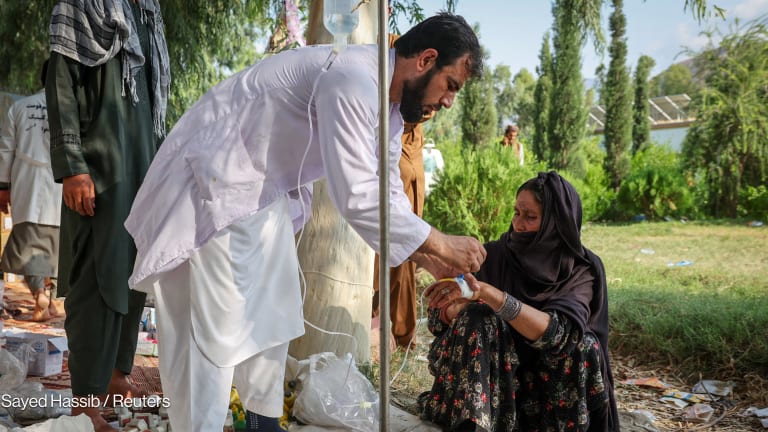
Liberia, Guinea and Sierra Leone faced the worst Ebola virus outbreak in history in the summer of 2014, and the team responsible for coordinating the U.S. government response effort had a grim equipment request: more body bags.
“The development community should know is this is a humanitarian crisis. This is an unprecedented situation for Ebola,” Tim Callaghan, the U.S. Agency for International Development’s disaster assistance response team leader, told Devex by phone from Monrovia, Liberia, where the DART team was stationed.
With more than 1,000 deaths already reported and concerns that the virus could spread further, humanitarian agencies and their partners taking part in the international emergency response were preparing to ramp up their efforts.
USAID’s Ebola DART team was responsible for assessing emergency needs and managing a coordinated U.S. interagency response, and they were laying the groundwork for a possible scaling up of the response effort. The agency had so far committed 100,000 personal protective equipment suits — 30,000 of which had arrived. That’s in addition to gloves, buckets, body bags, infrared thermometers and other supplies, which the team was airlifting in to supply public health workers in the three affected countries.
“This will be a large logistics operation,” Callaghan said.
Risk management
A particular challenge in responding to the Ebola outbreak in West Africa was balancing the need for more medical personnel with the U.S. government’s commitment not to put them at risk of contracting — and spreading — the virus.
“There may be a lot of well-intentioned medical staff in the world, but this is Ebola,” Callaghan said.
He added that to treat patients, medical professionals must receive additional training specific to the virus and follow a “meticulous” system to ensure they are confident and capable enough to mitigate risks.
“That will remain the challenge, of ensuring that we get people into the treatment centers, and that they receive care by — I do want to repeat this — highly-trained individuals, because we do not want to put more health care workers at risk,” Callaghan said.
See more news on the Ebola crisis:
● WHO on Ebola outbreak: We need more health workers
● JICA withdraws staff over Ebola fears, experimental drug 'ethical' to test
● Ebola fears undermine regional peacekeeping plans in Africa
USAID’s team was responsible for assessing conditions that might hamper the response and assistance effort. Callaghan did not identify any current bottlenecks for equipment, personnel or coordination, but did note that the persistence of rumors and misinformation had made things more challenging. To address this problem, Liberian President Ellen Johnson Sirleaf appeared on television to inform citizens that the government had set up a call center to spread better information about how the virus can — and cannot — be contracted.
USAID involved in 4 humanitarian crises
Ebola was only the latest among several large-scale humanitarian responses around the world that USAID’s disaster response officials were currently managing.
It was the first time in history the agency had had to respond to four such humanitarian operations. The other three were in South Sudan, Syria and Iraq.
In a radio interview, Thomas Staal, senior deputy assistant administrator in USAID's Bureau for Democracy, Conflict and Humanitarian Assistance, said that the international humanitarian agencies coordinating on all four situations were currently “at their limit.”
Staal noted that while the agency might have to request emergency funding from Congress at some point, “right now the budget is sufficient,” and in any case “the bigger problem right now is getting the people out there and making sure the work is getting done.”
When those people can quickly turn from emergency responders to conduits of a deadly disease, that challenge is even greater.
Read more on U.S. aid reform online, and subscribe to The Development Newswire to receive top international development headlines from the world’s leading donors, news sources and opinion leaders — emailed to you FREE every business day.








